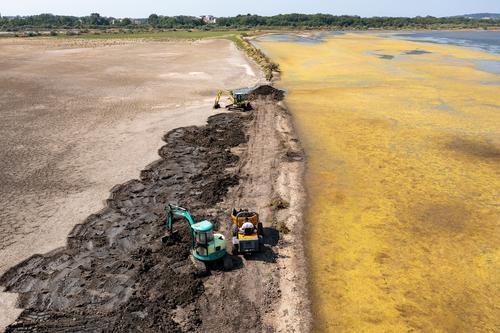++ Urgent initial restoration work completed at the Ulcinj salt works ++ Dams and dykes regulate the water balance in the salt pans ++ World Wetlands Day puts the spotlight on the importance of wetlands for human well-being ++

It may not look like it at first glance, but nature conservation really is taking place here. Excavators are shifting earth and restoring dams and dykes in Ulcinj Salina.
© CZIP
Flamingos and many other animal and plant species will benefit from the measures.
© Adrian PerovicRadolfzell, Ulcinj. On the occasion of tomorrow's World Wetlands Day, the international nature conservation foundation EuroNatur is highlighting positive developments in Ulcinj Salina in Montenegro. Excavators used the sediment from the salt basins over a length of 6.6 kilometres and piled it up to form new embankments. Parallel to the dredging work, the most important sluices and pumps were also repaired. Now the fresh water can be pumped out in winter and salt water pumped in during spring.
This work had been planned for a long time, but the unresolved ownership issue and absence of a proper management body delayed these vital measures for years. Additionally, the uncooperative attitude of the former director of the National Parks of Montenegro, who was the temporary manager of the Salina, contributed to the delay of restoration activities. During this time, the ecological value of Ulcinj Salina was seriously degraded. In the hot summers of recent years, some of the pools in the salt garden dried out completely, and in winter they were regularly flooded with fresh water - fatal for salt-loving animal and plant species.
These initial restoration measures will help to restore the long-term attractiveness of Ulcinj Salina in southern Montenegro for specialist species such as salicornia and flamingos. The restoration work also represents a first step towards the resumption of salt production. "Sustainably managed salt pans not only have a positive impact on flamingos and other salt-loving species, but also create jobs in the region in sectors other than tourism", said Dr Stefan Ferger, project manager at EuroNatur. "To further develop the work that has already been carried out, further investment is still required, but at least a start has finally been made after years of struggle. In this respect, Ulcinj Salina can become a shining example of the link between nature conservation, tourism and salt production."
Background information:
-
World Wetlands Day 2024: World Wetlands Day is celebrated every year on 2 February. This year's theme is "Wetlands and Human Wellbeing": https://www.worldwetlandsday.org
-
With an area of 1,500 hectares, Ulcinj Salina in Montenegro, which is part of the Bojana-Buna Delta, is one of the largest salt pans in the Mediterranean - and one of the most important breeding, resting and wintering areas for migratory birds along the eastern Adriatic coast. EuroNatur has been working with its Montenegrin and international partners for many years to protect the salt habitat on the Adriatic. The government in Podgorica declared Ulcinj Salina a protected area in 2019, partly due to pressure from our "Save Salina" campaign. Shortly after there followed its designation as a Ramsar site.
Enquiries: Christian Stielow, Mail: christian.stielow(at)euronatur.org, Tel.: +49 (0)7732 – 92 72 15


